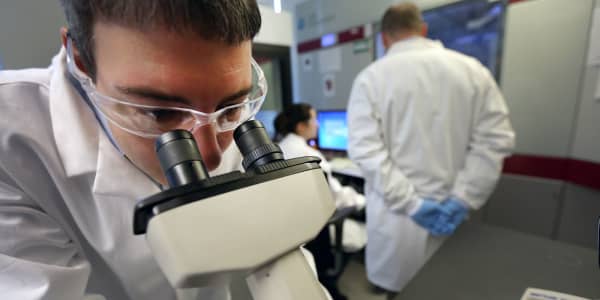From TVs to thermostats to Barbies, it seems just about everything is becoming "smart" these days. Heck, even some toothbrushes link with your phone to let you monitor how well you brush.
But the news earlier this year that First Response was launching a Bluetooth-enabled pregnancy kit had us scratching our head. Why does a relatively simple yes/no test, which requires you to pee on a stick, need to be connected to your phone or tablet?
As it turns out, it doesn't need to be. The stick will let you know if you can expect a visit from the stork whether it's connected or not. But if those three minutes between testing and results take too long, your pregnancy test hopes to keep your attention as it processes your hormone levels.
No, really.
Powered by Qualcomm technology, the First Response Pregnancy PRO Digital Pregnancy Test & App Access syncs with an app from the company to deliver a "personalized user experience" that the company says is aimed at reducing the stress that accompanies a pregnancy test.
As you wait for results, you're offered a variety of options, including "Calm Me" (which plays "relaxing visual content" on your smartphone or tablet), "Educate Me" (which offers information about fertility and pregnancy) and "Entertain Me" (which offers videos meant to distract and amuse users).
Once the results are in, the test (again, via the app) can either offer suggested ways to improve your odds if it's negative or give you an estimate of your due date, suggest questions to ask your doctor and help you track milestones in the pregnancy, among other things.
Digital tool for road warriors
"Taking a pregnancy test is extremely anxiety ridden," said Wendy Bishop, group brand manager for First Response. "Whether you get a positive or negative result, you're left with a lot of questions. Pregnancy tests have always been either yes or no, so we wanted to extend that relationship and hold women's hands throughout the test-taking process and though the entire pregnancy journey. ... It gives her an action plan for moving forward."
Bishop said First Response spent several years creating the device, speaking with women and incorporating their requests into the app that accompanies the test. (A single Bluetooth-enabled test runs $15, versus $9 for a pair of low-tech line tests.)
There was science behind the idea, too. First Response, which is a brand of Church & Dwight, says 64 percent of pregnant women today use their smart phones to access health information. By adding this functionality to the pregnancy test, the company and its partners believe they can proactively provide that.
"Consumers today, more than ever, are living a truly connected life ... [and] are beginning to demand digital tools and frictionless experiences when it comes to health care," said Rick Valencia, senior vice president and general manager at Qualcomm Life, in a statement. "We're proud to work with Church & Dwight to deliver this new evolution of connected pregnancy testing."




